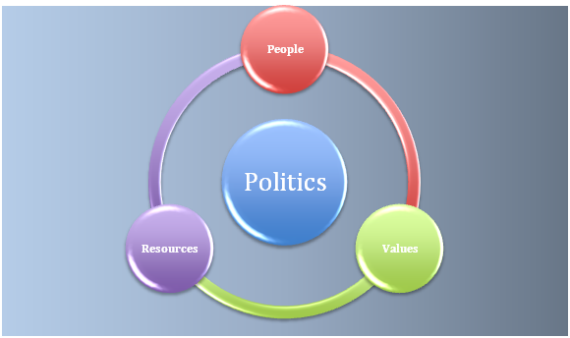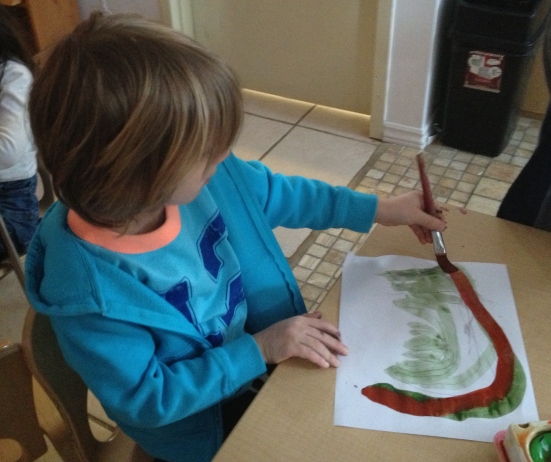By: Diane Kashin, Ed.D, RECE. In the last blog post, I spoke about shying away from theory in my practice. I am no longer a theory avoider. It has made a big difference to my professional knowledge and has increased my effectiveness as an adult educator. Theory requires deep thinking and it is not the only heady topic to consider in early learning. We can also reflect deeply about politics. Why is it when I hear the word politics spoken amongst my peers they are almost always referring to tensions in the workplace? Why is it when I bring up the topic of politics to students that they limit the scope of the concept to only something obscure that government is involved in? If we think deeply and dialogue about politics it can be an empowering experience for you and “Others”.
To be knowledgeable about politics as they relate to your practice is to have power. When using the term “power”, we are not referring to power over Others but power to empower Others and yourself. With knowledge comes power. To gain knowledge about politics requires acknowledging the definition and the application to your practice. Fagan (2011) suggests that it is not uncommon to hear educators say that politics and education don’t mix. The word lacks a clear definition. According to Fagan (2011) the dictionary definition that defines politics as a process by which groups of people make decisions is an indication that politics permeates daily living and education. The bottom line is that “all acts of group decision-making in the education system are political” and revolve around three entities which we illustrate below.
For more information: http://www.mun.ca/educ/faculty/mwatch/Laura%20Revised%20Fagan%20Morning_Watch_Sept_10.pdf
According to Fagan (2011), resources refer to knowledge. What is knowledge in early learning? Whose truth about knowledge do we believe? In early learning, people seek truth. What is the truth about how children learn best? What we see as truth depends on the politics of our time and culture. MacNaughton (2009) explains it this way:
If truths of the child are articulated and circulated by those with institutional power, such as professors in esteemed universities, then they are more likely to gain the position of ‘truth’ in Western early childhood textbooks. If those truths also link with political imperatives of the time, then they gain more power from being articulated by politicians and policy makers. Conversely if truths of the child are articulated and circulated by a young child in a remote and isolated village in the majority world, they are less likely to gain the position of ‘the’ truth in Western early childhood textbooks. The theories that gain the position of ‘the’ truth often serve the interests of the powerful and elite groups within a particular society at a particular point in time (p. 75).
Moss (2006) agrees with MacNaughton (2009) that early learning is increasingly dominated by one particular story or narrative. The Anglo-American narrative dominates and has a distinct vocabulary, “in which terms such as ‘development’, ‘quality’ and ‘outcomes’ are prominent” and “early childhood institutions are understood first and foremost, as places of technical practice (p. 128). In this view according to Moss (2006) children are “redemptive agents to be programmed” (p. 128). MacNaughton (2009) and Moss (2006) say that early learning professionals have choices to make and can take either a position of conformity or they can choose to reform common discourse or they can transform. One way to do this is to consider politics and ethics as first practice in early learning.
If we think of early learning environments as spaces where the players can think for themselves, create knowledge, identities, and values by challenging the dominant discourses then it is possible to move away from the technical practice which conforms to measures of quality set by others, and sees children only in terms of development.
The individual identities of children and their families at Acorn School is made evident through many different forms of documentation.
Technical practice is still a professional responsibility but it is seen as something that is recognized as never neutral and always permeated with values (Moss, 2006). If we accept that there is no universal truth and that the dominant discourse is not a necessity but a choice then practice can go beyond the technical perspective and possibilities can emerge (Moss, 2006). Michel Foucault (1926-1984), a philosopher and cultural theorist is considered a postmodern thinker. In his words, challenging the dominant discourse is:
to show that things are not as self-evident as one believed, to see that which is accepted as self-evident will no longer be accepted as such … since as soon as one can no longer think things as one formerly thought them, transformation becomes very urgent, very difficult and quite possible. (Foucault, 1988, p. 15)
By making ethics and politics first practice, it is possible to reconceptualise professional practice according to Dahlberg and Moss (2005). Ethics are always present in your professional practice even when they are not recognized. By examining ethics as they relate to the players in early learning programs, professionals can see that in every encounter, they have a responsibility to respect what Dahlberg and Moss (2005) refer to as alterity. Alterity is a philosophical term meaning “otherness”.
The work of one of the leading ethical theorists of the last century, Emmanuel Levinas (1906-1995) who used the term “ethics of encounter” has inspired reconceptualist thinking about early learning. Levinas capitalized the term “Other” to illustrate our responsibility to think about the “unknowability” of the “Other” whom you “cannot seek to understand through the imposition” of your own framework of thought (Moss, 2006, p. 130). Dahlberg (2003) expressed it this way:
To think of an Other whom I cannot grasp is an important shift and it challenges the whole scene of pedagogy…From this perspective teaching and learning have to start with ethics – with receiving and welcoming – and it is the receiving from the Other beyond the capacity of the I which constructs the discourse of teaching, a teaching that interrupts the philosophical tradition of making ourselves the master over the child. (p.273)
A child at Acorn School expresses his Otherness; a master of his own learning as he expresses his ideas with brush and paint.
What this means for early learning professionals is that you have a responsibility to offer a program that expands possibilities for children and their families by being open to the otherness of the Other and not conforming to ways of knowing that limit potential.
Dahlberg, G. (2003). Pedagogy as loci of an ethics of an encounter. In M. Bloch, K. Holmlund, I. Mogvist & T. Popkewitz (Eds.), Governing children, families and education: Restructuring the welfare state. New York: Palgrave.
Dahlberg, G. & Moss, P, (2005). Ethics and Politics in Early Childhood Education, Oxfordshire: Routledge Falmer.
Fagan, W. (2011). Politics and Education: Decision Making. Morning Watch. http://www.mun.ca/educ/faculty/mwatch/Laura%20Revised%20Fagan%20Morning_Watch_Sept_10.pdf
Foucoult, M. (1988). Politics, policy, culture: Interviews and other writings 1977-1984 (L. Kritzman, Ed.). London, UK: Routledge.
MacNaughton, G. (2009). Shaping early childhood: Learners, curriculum and contexts, Berkshire, England: Open University Press.
Moss, P. (2006). Early childhood institutions as loci of ethical and political practice. International Journal of Education Policy, Research and Practice ISSN: 1528-3634



This is such a thoughtful and thought provoking post. You have reminded me of the need to always be questioning dominant discourses. Thank you for writing and sharing.
LikeLike
Hi Jen,
Thank you for your kind words! I think all ECEs need to question and critique to develop their own theories about teaching and learning. If we always accept without question, what has been put forward by “experts” we are not exercising our full capacity as critical thinkers. I especially like questioning with Others! By hearing the voice of Others in our practice whether it be families, children or our colleagues we broaden our perspectives and understanding of how meta-narratives (dominant discourses) can limit the potential for deep learning. I found this article to be very helpful when considering these professional big ideas: http://www.cyc.uvic.ca/uccr/pubs/01.Pacini_Pence_Contextualizing_2005.pdf
Diane
LikeLike
As a recent graduate of the BCD degree program, I slowly embraced the “Reggio” inspired learning philosophy that is wrapped in the constructivist theory. I began to practice what I knew, and was eager to learn from others. So when I read this post Diane, I began to reflect on my own environment. As a Reggio inspired educator, I provide the children with opportunities to take risks by standing on a chair to built higher, use OWL to allow conflict to unfold, and support the wonder of learning through the lens of the children by following their interests. Along the way, this practice has been met with criticism and the lack of understanding. However, with time and advocating, like-minded educators began to collaborate, reconceptualizing early learning by focusing on deeper thinking and providing a space for “Other” as referred to by Levinas (Kashin, 2013). The transformation appears to be naturally unfolding and we as a team use open dialogue to reflect and grow on this learning journey.
On a personal note, I had a revelation of sorts when I heard the quietest child in the room respond to another child who asked, “ what did you make?” he responded,
“what do you think it is?” For me, it was magical… he openly invited others to interpret his work, validating his confidence and ability to take another’s perspective. Since then, there has been wonder, curiosity, and co -constructing of knowledge through conflict, negotiations, collaboration, respect and the of course the unexpected. The children feel safe enough to challenge the educators and use critical thinking to plead a case and feel powerful when their voices are heard. Others use letter writing, persuasion and collaboration through everyday circumstances that teach us to respect our differences while developing our own values.
LikeLike
I have benefitted from the support of wonderful teachers through my process of completing the Kindergarten Specialist AQ, with theory at the fore of what we explored all the way through. I loved the courses and feel a bit empty now that I can’t go back for another K AQ!
That said, it is also difficult to be so versed in the why, the how, the what of emergent curriculum, to know it intellectually and also viscerally (to have seen it allow incredible growth for students, and like Dune above, to have seen risk-taking among all students because the environment invites it) and then to butt up against the conformist opinion. I sometimes feel I need to bite my tongue, to let it go, when I hear disparaging comments said about a program based on following student interests and ideas. When asked my opinion, I may be evangelical in my zeal for inquiry-based planning, but when I overhear “Well, they aren’t coming to grade one ready” then I can’t help but despair, not sure if my interjecting will help or simply widen the gulf. Too often I let it go, and sit in uncomfortable silence.
I am fortunate in that I work in a fantastic school, where although we will be half-day until the last year of implementation in Ontario, our admin are very supportive of FDK ideas, and the K team are all on the same page with Reggio-inspired practices and materials in our classrooms. The new wave of ideas is spreading across classrooms from K and moving up, and those comfortable with accepting risk can be a lifeline to teachers taking baby steps into choice, small-group inquiry, and “short-range planning” (I just made that up).
LikeLike
In awe of that anrsew! Really cool!
LikeLike
this is just fabulous rich deep thoughts. There is always more to learn about pedagogical documentation. Thank you for making your ideas visible and available.
LikeLike
Pingback: Political influences and Pedagogical Documentat...
Pingback: Playfulness and Playlessness: The Politics and Pedagogy of Play | Technology Rich Inquiry Based Research